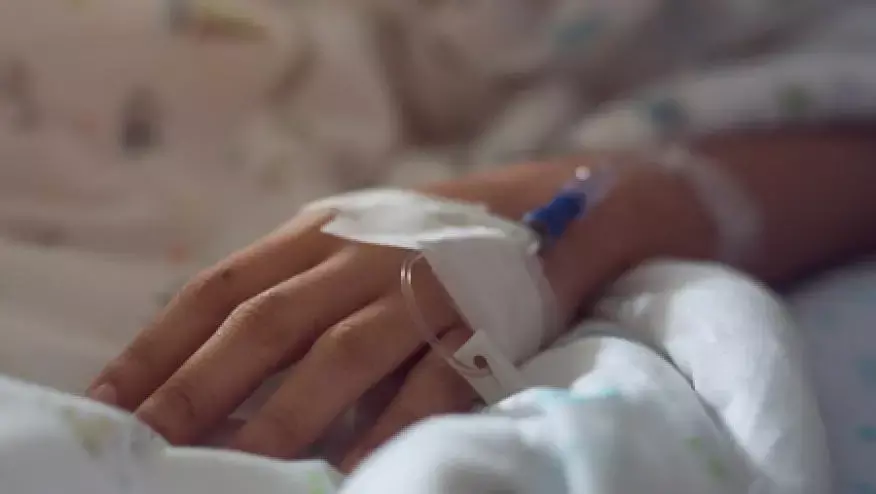- Home
- Medical news & Guidelines
- Anesthesiology
- Cardiology and CTVS
- Critical Care
- Dentistry
- Dermatology
- Diabetes and Endocrinology
- ENT
- Gastroenterology
- Medicine
- Nephrology
- Neurology
- Obstretics-Gynaecology
- Oncology
- Ophthalmology
- Orthopaedics
- Pediatrics-Neonatology
- Psychiatry
- Pulmonology
- Radiology
- Surgery
- Urology
- Laboratory Medicine
- Diet
- Nursing
- Paramedical
- Physiotherapy
- Health news
- Fact Check
- Bone Health Fact Check
- Brain Health Fact Check
- Cancer Related Fact Check
- Child Care Fact Check
- Dental and oral health fact check
- Diabetes and metabolic health fact check
- Diet and Nutrition Fact Check
- Eye and ENT Care Fact Check
- Fitness fact check
- Gut health fact check
- Heart health fact check
- Kidney health fact check
- Medical education fact check
- Men's health fact check
- Respiratory fact check
- Skin and hair care fact check
- Vaccine and Immunization fact check
- Women's health fact check
- AYUSH
- State News
- Andaman and Nicobar Islands
- Andhra Pradesh
- Arunachal Pradesh
- Assam
- Bihar
- Chandigarh
- Chattisgarh
- Dadra and Nagar Haveli
- Daman and Diu
- Delhi
- Goa
- Gujarat
- Haryana
- Himachal Pradesh
- Jammu & Kashmir
- Jharkhand
- Karnataka
- Kerala
- Ladakh
- Lakshadweep
- Madhya Pradesh
- Maharashtra
- Manipur
- Meghalaya
- Mizoram
- Nagaland
- Odisha
- Puducherry
- Punjab
- Rajasthan
- Sikkim
- Tamil Nadu
- Telangana
- Tripura
- Uttar Pradesh
- Uttrakhand
- West Bengal
- Medical Education
- Industry
Pegloticase response rates higher when co-treated with immunomodulating therapy in gout patients

Patients with uncontrolled/refractory gout have heavy disease burden, but few treatment options. Pegloticase lowers serum urate (SU), but anti-drug antibodies can limit treatment efficacy. Evidence supports immunomodulator-pegloticase co-administration to increase sustained urate-lowering rates, but published cases are limited. The study by Aaron Broadwell et al investigated experience with pegloticase-immunomodulation co-therapy at two community rheumatology practices.
Patients initiating pegloticase with immunomodulation were included in the study. Patient/treatment characteristics and proportion of responders (>=12 pegloticase infusions, SU < 6 mg/dl at infusion-12) were examined. Patients on therapy at data collection with <12 infusions were excluded from response analyses. eGFR before and after therapy was examined.
Key findings of the study were:
• Thirty-four patients (79% male, 62.4 ± 16.3 years) with uncontrolled gout (SU = 9.1 ± 2.0 mg/dl, 91% tophaceous) were included.
• Most-reported comorbidities were hypertension (76%), obesity (71%), osteoarthritis (68%), and CKD (47%).
• Pre-therapy eGFR was 65.4 ± 25.2 ml/min/1.73 m2 (41% eGFR <60 ml/min/1.73 m2 ).
• All patients initiated immunomodulation before (5.3 ± 3.0 weeks, n = 32) or at (n = 2) first pegloticase infusion.
• Subcutaneous methotrexate (15.4 ± 4.9 mg/week, n = 20), oral methotrexate (15.3 ± 3.6 mg/week, n = 9), mycophenolate mofetil (1000 mg/day, n = 3), and azathioprine (100 mg/day, n = 2) were administered. Patients received 14.6 ± 7.1 infusions over 28.5 ± 14.9 weeks.
• Overall response rate was 89%, ranging among immunomodulators (subcutaneous methotrexate: 93%, oral methotrexate: 89%, mycophenolate mofetil: 100%, azathioprine: 50%).
• On average, eGFR increased during therapy (+10.3 ± 16.9 ml/min/1.73 m2), with CKD stability/improvement in 85%.
• Nineteen patients (56%) experienced gout flares.
• No infusion reactions or infections were noted. No new safety concerns were identified.
The authors concluded that – "this case series highlights experiences with pegloticase plus immunomodulation co-therapy in a real-world clinical setting, further supporting the use of immunomodulators to increase pegloticase treatment response rates. Importantly, several different immunomodulation agents may be effective for increasing treatment response rates and seem well tolerated by patients with uncontrolled gout. However, further study is needed, particularly with AZA and MMF."
Further reading:
Community Practice Experiences with a Variety of Immunomodulatory Agents Co-Administered with Pegloticase for the Treatment of Uncontrolled Gout
Aaron Broadwell, John A. Albert, Lissa Padnick-Silver, Brian LaMoreaux Rheumatology Therapy (2022) 9:1549–1558 https://doi.org/10.1007/s40744-022-00492-3
MBBS, Dip. Ortho, DNB ortho, MNAMS
Dr Supreeth D R (MBBS, Dip. Ortho, DNB ortho, MNAMS) is a practicing orthopedician with interest in medical research and publishing articles. He completed MBBS from mysore medical college, dip ortho from Trivandrum medical college and sec. DNB from Manipal Hospital, Bengaluru. He has expirence of 7years in the field of orthopedics. He has presented scientific papers & posters in various state, national and international conferences. His interest in writing articles lead the way to join medical dialogues. He can be contacted at editorial@medicaldialogues.in.
Dr Kamal Kant Kohli-MBBS, DTCD- a chest specialist with more than 30 years of practice and a flair for writing clinical articles, Dr Kamal Kant Kohli joined Medical Dialogues as a Chief Editor of Medical News. Besides writing articles, as an editor, he proofreads and verifies all the medical content published on Medical Dialogues including those coming from journals, studies,medical conferences,guidelines etc. Email: drkohli@medicaldialogues.in. Contact no. 011-43720751


